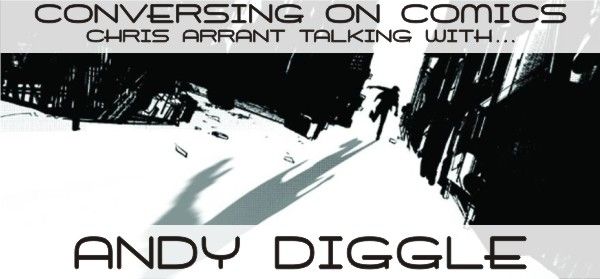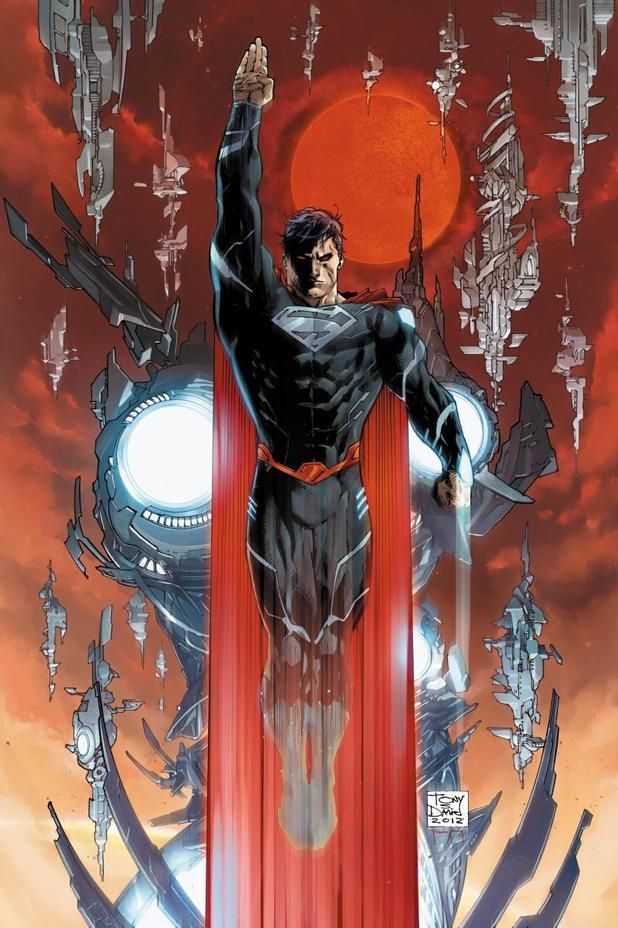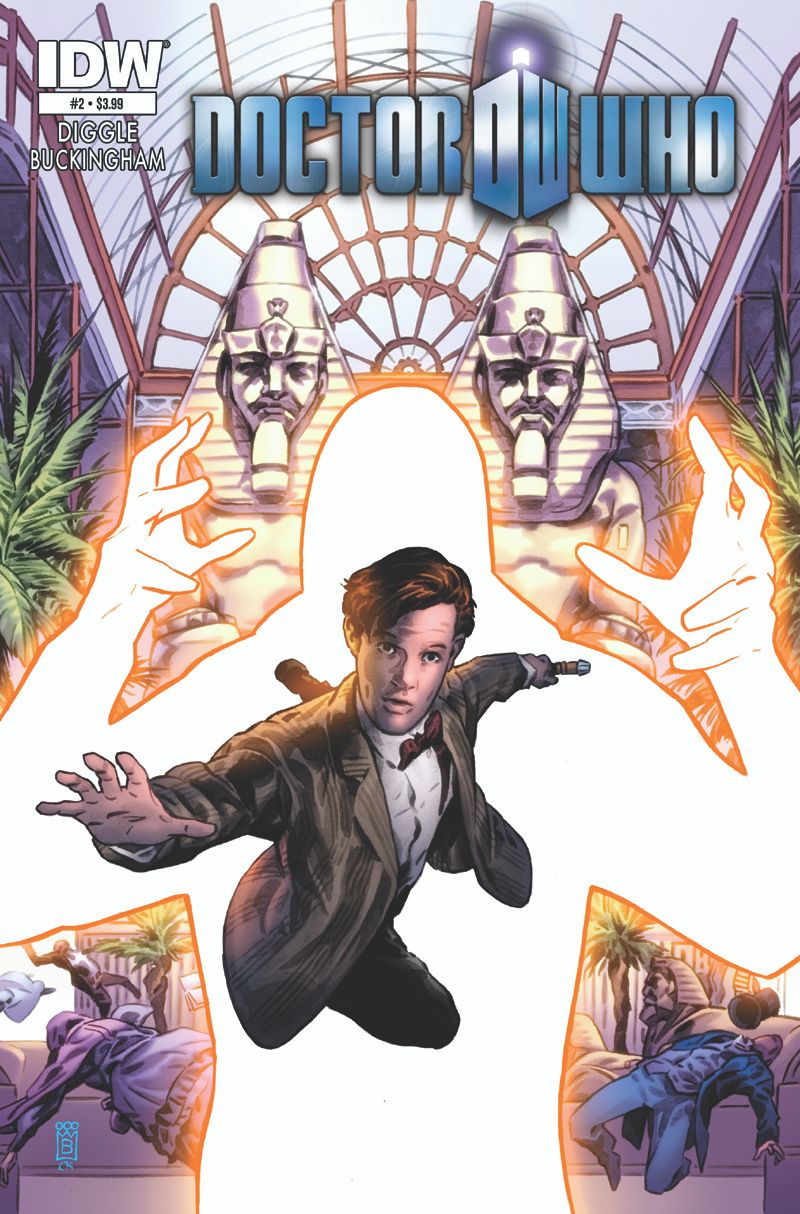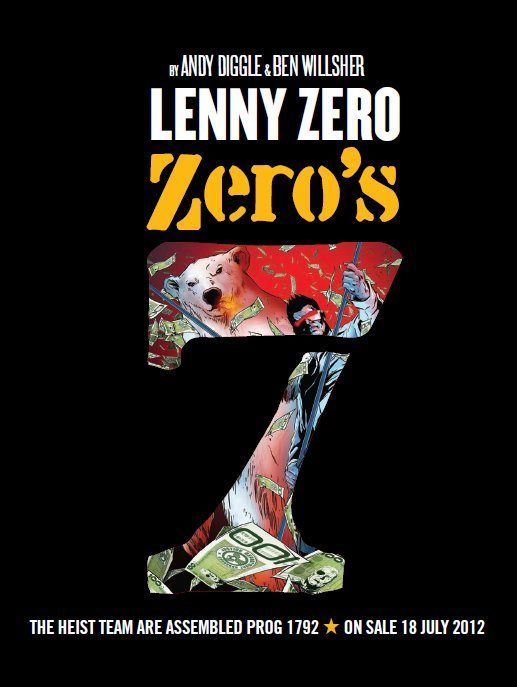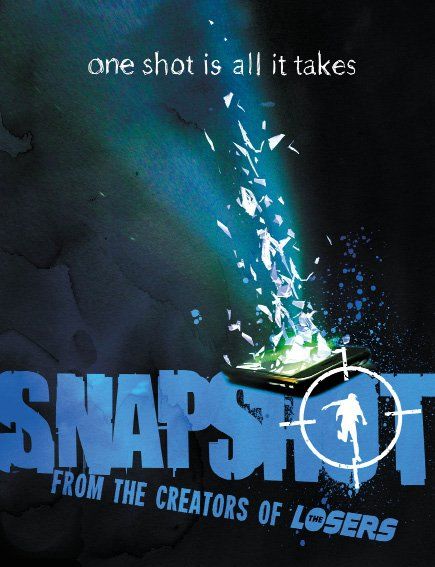In any entertainment field, the only thing more difficult than breaking through and scoring that first hit is doing it again and again. And in comics, one of the people I've marveled at for his ability to top his previous hit and reinvent himself, all while staying true to himself and his style, is writer Andy Diggle.
He's done a lot during his 15 years in comics: He helped to turn around then-flagging 2000AD with a back-to-basics approach. He dusted off a forgotten set of DC Comics characters and re-made them into a popular Vertigo series with The Losers. He gave readers a modern vantage point for DC's archer Green Arrow. He took Marvel's Daredevil to the darkest point. And at this year's New York Comic Con, he was the belle of the ball in terms of announcements with four new titles, and several more already in the works.
Let's run through them: In February, Image will be publishing Diggle's collaboration with The Losers artist Jock on a creator-owned series called Snapshot. In March, Diggle will take over Action Comics from writer Grant Morrison and join Robert Kirkman's Thief of Thieves as writer of the third arc. He also inked a deal with Dynamite Entertainment for an as-yet-untitled series in the publisher's new line of crime books.
My colleagues at Comic Book Resources have already interviewed Diggle about each of these new projects, so I was able to take a step back and talk with the Lancaster-based writer about his career as a whole, from how he works on comics to how he deals with his own success.
Chris Arrant: New York Comic Con was a big convention for you: Four new books for you, if you count Snapshot coming to Image as a new book because it’s new to us Americans. How did the stars all align for all four of these to be announced in one convention?
Andy Diggle: It wasn't planned that way; it's just how the timing shook out. I'd been attached to Thief of Thieves for six months before Robert Kirkman announced it in New York. By contrast, Action Comics and the Dynamite crime book came together relatively recently. It's really just coincidence that they all got announced at the same time, but it did make for a crazy NYCC for me. I was on six different panels that weekend -- DC Comics (Superman), Image (Snapshot), Skybound (Thief of Thieves), IDW (Doctor Who), 2000AD (Lenny Zero) and Dynamite (crime line). My head was spinning. But it's nice finally to be able to talk about all these projects I've been lining up since I left Marvel. I'd kind of dropped off everyone's radar there for a while.
You’re known for doing big action in comics, summed up best with The Losers, but I feel some resistance sometimes with you sliding easily into being a “superhero” writer. You’ve done it, you’ve done great work at it, but it doesn’t seem to be at the center of you the way it is for some writers. Am I totally misreading it? What are your thoughts on superheroes and writing them?
2000AD, Warrior and the DC stuff that would eventually morph into Vertigo -- they were my "gateway drug" comics growing up. There are plenty of superhero books I've loved over the years, but I've always tended to follow writers rather than characters. So I'd follow Grant Morrison, say, from Animal Man and Doom Patrol to X-Men, but I might not stick around after a new writer came on board. So that meant my knowledge of superhero comics was kind of patchy. I never acquired that encyclopedic knowledge of continuity that seems to be required for a deep appreciation of superhero lore. So when I did come to write superheroes, I approached them as something of an outsider. That gave me a different perspective on the material, which hopefully translates into something fresh and interesting that people want to read. I'm still proud of the work I did on Adam Strange: Planet Heist and Green Arrow: Year One, and people still seem to enjoy those books.
CBR has already talked with you specifically about your run on Action Comics with Superman, but now that you just put the first draft of your first issue to bed, how has your perspective on the hero changed or matured?
My perspective hasn't changed much, but the character has. DC want a more modern, edgier Superman in the New 52. I love the klutzy Christopher Reeve Clark Kent, but we're trying to do something different here.
Although you say you’re not well-versed in superheroes, what would you say is the one you’re most knowledgeable about from your reading?
I'd have to say Batman. The Dark Knight Returns was literally the first Batman comic I ever read. I didn't even realize it was a miniseries at first -- I didn't know what a miniseries was at the time! -- so I picked up Book 4 first because it had the coolest-looking cover. So of course, I had no idea what was going on -- not just because I'd jumped into the final act of the story, but also because I had no awareness of Batman's history or supporting cast. I grew up with the Adam West TV show. I didn't know who Gordon or Diana or Selina or Ollie were. I was pretty much clueless. I think it's a testament to Frank Miller, Klaus Janson and Lynn Varley's work that, despite my complete ignorance, the comic STILL blew me away. Just amazing work.
After seeking out the rest of the series, I picked up Batman Year One as the issues came out, and that was another huge formative influence for me. From that point on, if I was going to read a superhero book, it was going to be Batman. That was where the interesting stuff was being done in the late 80s - Killing Joke, Arkham Asylum, stuff like that. I'd pick up these prestige books rather than monthly continuity. I've never been a fan of long-form soap. I like my stories short and punchy. Beginning, middle, end.
The thing about Batman is that - like Judge Dredd - there are a million different ways to approach the character. You can do gritty crime, absurdist humor, character-driven drama, or anything in between. Superman is tougher. Superman isn't open to so many different interpretations. You have to respect that core concept of Superman - that innocence and decency - and if you don't, it just isn't going to work.
2012 is the first year you’ve been completely freelance since 2003. You spent five years exclusive to DC, had a brief break in 2008, and then jumped into bed with Marvel from 2009 to 2012. What’s it like now on the other side of it, freelancing without any firm commitments or obligations to just one publisher?
It's great. I'm very much enjoying being able to play the field. It's good to be back working with DC again, but I can't see myself signing exclusives with anyone in the future. I have too many projects of my own that I want to develop, and I like the freedom to be able to pursue new opportunities outside of comics as they arise. Being based in the U.K., where we have universal healthcare, there's less incentive to go exclusive with an American publisher.
Outside comics, what are opportunities you’re looking into? Video games, movies, TV, what?
Most of it I can't really talk about, but occasionally I'll get an email from someone in another industry who wants to hire me for something. And they always need it like yesterday. Nine times out of 10, these things go nowhere -- you develop good bullshit radar -- but when something cool and unexpected does pop up, it's nice to have the freedom to pursue it.
For example, earlier this year I was approached by a big advertising agency who wanted me to develop a promotional comic for the new Volkswagen Scirocco in China. I invited Jock to draw it, and he spent a few weeks in Beijing working with photographers and graphic designers on this VW "Kingdom of Night" project, which you can find online. It sounds crazy, but it was actually a lot of fun, and our online VW comic generated over 3 million page hits and 10,000 test-drive requests. It's satisfying to reach that wide an audience, and fun to stretch a different set of muscles once in a while.
I'm also toying around with some TV pitches and short stories, but I'll have to wait until the middle of next year at least before I can really focus on them.
Getting back to comics, you signed on to work with Robert Kirkman on Thief of Thieves. Logistically, is this different than doing something for DC or Marvel since you’re working with the owner of the book rather than a company-owned thing like at DC or Marvel?
Thief of Thieves is owned by Robert Kirkman, so he's pretty much hiring me to write work-for-hire on his baby. But because Robert is just one guy -- and himself a writer of some renown -- it's a lot easier dealing with him than with some monolithic corporation. We can make creative decisions based on what's best for the story, rather than some outside market-driven bullshit. Thief of Thieves is a real pleasure to work on. Everyone involved is smart, professional and affable. Genuinely one of the most satisfying and enjoyable creative experiences of my career to date. Long may it continue!
What were the initial conversations like between you and Kirkman (or Kirkman’s editors) about you coming onto Thief of Thieves?
It actually came up while I was chatting with Image publisher Eric Stephenson in a pub in London. I was enthusing about crime comics and kinda-sorta pitching him some ideas of my own, when right out of the blue he asked if I'd be interested in writing an arc of Thief of Thieves. I assumed it was one of those "too good to be true" moments - drinks had been taken! - but he and Robert followed it up by email. Robert gave me a clear brief, he liked my pitch, and it all came together very quickly and easily. Those guys run a tight ship. Robert's notes on my first draft script were basically, "This is great! Keep doing what you're doing." That's the kind of editorial feedback I like!
At this point in your career, I imagine you can be somewhat choosy on what work-for-hire projects you take. What are you looking for in a comics gig?
The bottom line for me nowadays is, am I going to have fun with this? You're going to be living with this thing for months or years, so if it's no fun, it's not going to be worth it. It's also important who's going to be drawing it. You want to work with good people. Especially good editors.
You initially rose to fame as editor of 2000AD, taking that title back to what people called “old school” values for the title. You’re back doing work as a writer there from time to time – what do you think of the evolution of the title since you left the editor’s chair?
I think Matt Smith has done a fantastic job as editor. The comic's in better shape now than when I left it. The current line-up of stories and creators is amazing, and I'm particularly enjoying the cleverly interlinked Trifecta stories. I've never seen this done in an anthology before -- and the fact that it wasn't announced made it all the more powerful as a reader. It just snuck up on me and knocked me sideways. So yeah, respect to writers Al Ewing, Rob Williams and Si Spurrier, and artists Henry Flint, D'Israeli and Simon Coleby, for Trifecta. And a special shout-out to Ian Edgington and Ian Culbard for excellent steampunk fantasy Brass Sun. I'd encourage American readers to check it out digitally if they can't easily import issues. Prog 1800 is a great place to start, or the Christmas issue coming up soon.
Although several years in the rear-view mirror, when people talk about you they point to The Losers as your signature work. I know there’s a lot of positives to that, but do you ever feel any negatives to that being your defining work for people some six years on?
It kind of reflects what I feel myself, which is that I do my best work when I'm encouraged do my own thing, or at least to re-invent something and make it fresh. I didn't get into comics so I could write my favorite characters - I got into it because I wanted to create new characters and tell new stories. With The Losers, I was playing from the heart, and I think it shows. I also consciously wrote it as a comic for people who don't read comics, and I think it worked pretty well in that regard. A lot of girls have told me their boyfriends gave them The Losers to read and it got them into comics. That's great.
You somewhat famously did The Losers without much knowledge of the original comic series, only using the familiar title to introduce this new concept to readers. Do you ever think what would’ve happened if you and Jock did it on your own, creator-owned, with that title and the DC ownership shucked off?
My original idea for The Losers was to use the original WW2 team to heist a lost cache of Nazi gold in the 1950s. We decided against it because it skewed too close to War Stories and American Century, but I still think about filing the serial numbers off that initial concept and doing it as a creator-owned mini-series someday. My profile's higher nowadays - nobody knew who I was back when Vertigo editor Will Dennis offered us The Losers - so I think it'd stand a better chance of success now than if we'd done it back in the day. But there are so many new stories I want to tell, and I have so much new work lined up, I don't know when I'll get around to any of them.
I’ve been talking to Kelly Sue DeConnick, and she was telling me how she found a way to write Captain Marvel by finding something in common with the character in her own life. For writing Doctor Who, Superman, or any other character that’s not yours, how do you connect with that character to write them properly? Or do you even need to?
It really depends upon the character. With John Constantine, I'd already been following the character for something like 20 years, so writing Hellblazer felt like meeting up with an old friend. I already knew the character inside and out, knew how he talked and felt and acted. So that was easy. With other characters, it can be harder. You need to make them relatable, and in order to do that you need to be able to relate to them yourself. Kelly Sue's absolutely right, of course -- you need to find that part of them which connects with something in your own life, something from the heart. You might think that'd be hard with someone as powerful as Superman, but he feels lonely and isolated and misunderstood -- certainly in the early days of the New 52 -- and I think that's something we can all relate to, sadly. But it's important that the relatability of the character isn't compromised by forcing them into conflict situations just for the sake of plot and action. Too many superheroes instantly start hitting each other over the slightest disagreement. If people behaved like that in real life, they'd be locked up. They'd be assholes.
It seems some of the best comics are by long-term creative duos: Kirby/Lee, Claremont/Byrne, Ennis/Dillon, Azzarello/Risso, etc. For you that seems to be Jock. What’s it like being known so much for working with another person?
It's great. We just click. I've been working with Jock ever since I pulled his art samples out of the slush pile at 2000AD and offered him Lenny Zero -- my first published work -- and we're on something like our fifth project together now. I think we make a pretty good team. I feel much the same way about Davide Gianfelice now too. Ever since I first saw his work on Northlanders, I knew I had to work with him. Since then we've done Daredevil Reborn and Six Guns together, and we're talking about lining up something new for next year, once he's finished his run on Conan for Dark Horse. Seeing Davide and Jock bring my work to life on the page is always a thrill. I feel flattered to be working with them.
Do you write scripts differently if you know Jock is on the other end drawing it?
I maybe write a little bit tighter for Jock, just because we know each other's moves and there's no need to over-explain. He shares my instinct for when to pull out wide, or when to go into a close-up on the look in someone's eye as they deliver a line. We both try to sell those punchy dramatic moments. It's great when you click like that. I try to write to an artist's strengths, but sometimes you won't know who'll be drawing a particular story, and in those instances I'm maybe a little more prescriptive in the panel descriptions.
You’ve been on both sides of the comics table – editing comics and now writing comics. When it comes to the actual process of writing a story and writing it for the comics form, have there been milestones or landmarks to you when you feel like you learned something new about writing comics? Like leveling up in a video game, but in comics writing?
I certainly learned a huge amount about storytelling from my time in editorial, working with some of the best writers and artists in the business. Especially working with John Wagner, who's something of a hero of mine, on Judge Dredd vs Aliens. But I don't know if there were any particular "light bulb over the head" moments for me. It was more of a gradual accumulation of craft skills. And diplomacy. Diplomacy is important.
When you come in and talk about writing a series for someone else, what are the kinds of questions you ask to get to know the playing field of what’s expected of you?
I ask about the style and tone they're looking for, just to make sure it gels with my own take on the material. They might want something dark and gritty, but if I think the character is inherently cartoonish or the plot logic just isn't there, then it might not be for me. My brother's an engineer, and he always talks about getting a "design specification" from whoever is signing the checks. "Tell me what you want." It saves a lot of hassle down the road. The problems tend to arise when the editorial brief keeps changing all the time. The editors who want you to throw a lot of shit and hope something sticks - those are the guys you might not be in a hurry to work with again. The best editors help you line up their vision with your own, instead of trying to use you as some kind of remote-controlled sock puppet for transcribing publisher edicts. Fortunately I've been lucky to work with some great editors like Will Dennis, Steve Wacker and Tom Brevoort. More power to them!

